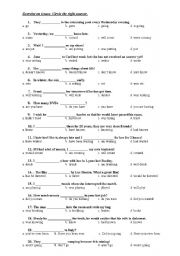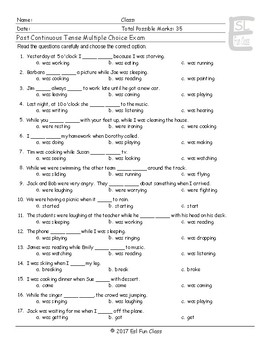Multiple Choice is a simple closed-ended question type that lets survey takers select one answer from a defined list of choices.
- Present Perfect Tense Multiple Choice Questions Pdf
- Tenses Multiple Choice Questions Pdf Printable
- Tenses Multiple Choice Questions Pdf Download
- This set of Professional Communication Multiple Choice Questions & Answers (MCQs) focuses on “Types of Punctuation”. Which of these is not a punctuation mark? A) Full stop b) Comma c) Colon d.
- Question Tag Quiz, Multiple Choice Questions, Exercises, Worksheets - 1. Object Oriented Programming in C MCQ with Answers Pdf More.
Digital Logic Design Multiple Choice Questions with Answers pdf for MCA, BCA and other IT. Jamia Millia Islamia entrance exam question papers for class.
Jump to...
What Survey Takers See |
Survey takers will be able to choose one option from a list of answer choices you provide. When you create a Multiple Choice question you can limit or require a certain number of choices. If you use this option, we recommend updating the error message so people know how to answer the question. TIP! If you send your survey by Email Invitation, you may be able to embed a Multiple Choice question in your email so respondents can answer with just one click. |
Creating a Multiple Choice Question |
To add a Multiple Choice question to your survey:
Before you send out your survey, preview the survey design to see what your survey will look like to people taking it. Question Options and SettingsUnder the Edit, Options, and Logic tabs, you can further customize the question in the following ways:
Learn more: Editing Questions |
Analyzing and Sharing Data |
Multiple Choice questions are easy to analyze since they're closed-ended. To break down your results even more, use Filter and Compare rules. ChartsEvery chart type is available for this question type, except the Gauge Chart. The depth display option lets you to choose between the following chart views:
Weighted AverageIf you show Weighted Averages, we apply weights to each answer choice. The weights match the order of the answer choices in your survey design, and can't be changed. For example:
TIP! To customize weight values, use a single row Matrix/Rating Scale question instead. Calculating Weighted AveragesThe rating average is calculated as follows, where: w = weight of the answer choice x = response count for the answer choice Exporting & Sharing DataAll export types are available for Multiple Choice questions. If you want to share your results with others, you can share your exports or create a Shared Data page. Learn more about our sharing options: Sharing Survey Results. |
Get answers
Sign up
Start making better decisions with the world's leading survey platform.
Log InAlready have an account? Log in for faster support.
Choose the correct tense to go in the gap.


We use the past continuous to talk about a past event that was going on for a period of time in the past.
Present Perfect Tense Multiple Choice Questions Pdf
We use the third conditional when we are imagining a different past. In other words, the person didn’t arrive late. We use if + past perfect with modal verb + have + past participle.
We often use just, yet, still and already with the present perfect because they are related to the present moment. Yet used with the present perfect means 'at any time up to now'.

The simple past is used to show a completed action in the past. It is often used with a specific time e.g. one year ago, yesterday, when I was a child.

Tenses Multiple Choice Questions Pdf Printable
We use the present perfect for something that started in the past and continues up until the present day. This is 30 years ago up until now. It’s not a finished event so it’s not past simple and it doesn’t refer to the future.
Tenses Multiple Choice Questions Pdf Download
We use the simple present to talk about habitual present actions. As it is third person singular (Mick), we must have the ’s’.
This is an unfinished action so is a perfect tense. It is present (I am tired) so it will be a present tense (so not C). The present perfect continuous can be used to emphasise the length of time that has passed, rather than the present perfect which is more neutral (e.g. I’ve studied for hours).
The future perfect continuous tense, also known as the future perfect progressive tense, is used to indicate a certain duration of time up to a point in the future.
This is a time-related activity. When the main clause has a modal such as will, may, can, shall, the verb in the clause following the preposition (before) is in the present tense.
We use the simple past to refer to shorter actions that happen in the middle of a longer action. Rung is the past participle so it can't be this.